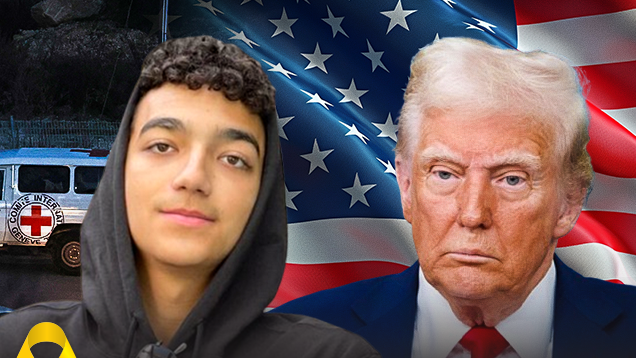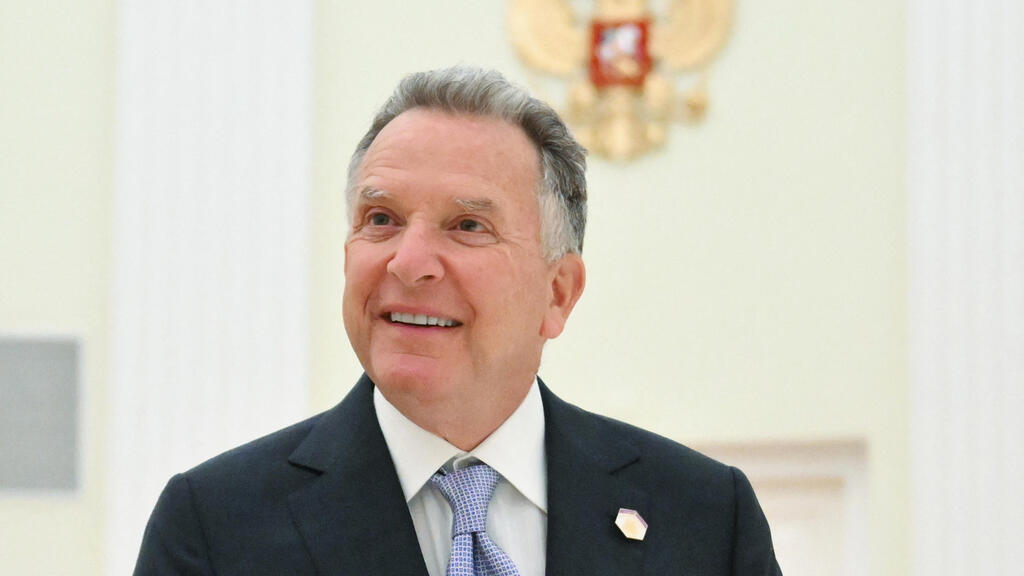Getting your Trinity Audio player ready...
Hamas is expected to release American-Israeli hostage Edan Alexander later today in what Israeli officials describe as a political gesture timed to U.S. President Donald Trump’s upcoming visit to Doha.
This marks the second time the group has considered freeing Alexander as a goodwill offering to Trump. A previous attempt collapsed after it was seen as an effort to drive a wedge between Israel and the U.S., derailing negotiations despite initial agreements.
3 View gallery


Edan Alexander, U.S. President Donald Trump
(Photo: Joshua Sukoff/Shutterstock, Zain Jaafar / AFP)
When direct talks resumed in March, Hamas demanded a high price for Alexander’s release — including the freeing of senior Palestinian prisoners — while keeping Israel out of the process entirely.
However, as negotiations progressed, senior Hamas officials in Doha came to view the matter as strictly between the group and Washington. According to Israeli assessments, the breakthrough came only after Qatari pressure.
Israel has previously accused Qatar of sabotaging Egypt’s latest initiative to secure the release of a small number of hostages. But this time, officials say, Qatar “delivered” — just ahead of Trump’s arrival in the Gulf state.
The U.S. president is not expected to stop in Cairo during his Middle East tour but will visit Doha, raising the likelihood that both Hamas and Qatar timed the move as a joint diplomatic gesture. Some Israeli officials believe the release wouldn’t have happened without the trip.
The move is seen in Israel as a diplomatic failure: while the U.S. succeeds in securing the release of its last living citizen held in Gaza, Israel has yet to secure freedom for more of its hostages. The development fits Trump’s “America First” approach — much like his earlier deal with the Houthis that excluded Israeli concerns and failed to demand an end to attacks on Israel. Now, the administration is focused on the safe return of Alexander alone.
Hamas video showing Edan Alexander in captivity
According to Prime Minister Benjamin Netanyahu’s office, Alexander will be released “unconditionally” — a rare step for Hamas, which typically demands a heavy price for captured Israeli soldiers. Nonetheless, Israeli officials expect the country will now be pressured to maintain a temporary ceasefire, allow the entry of humanitarian aid into Gaza and resume negotiations — largely under American insistence.
A senior Hamas official, speaking anonymously to the Associated Press, said the release was imminent and described it as “a gift to President Trump and in return he will give back a better one.”
In return, Hamas gains more than just diplomatic capital: It gets another chance to disrupt Israel-U.S. relations. With Jerusalem likely to resist American demands, the terror group is banking on both political leverage and direct recognition from the Trump administration — its second such engagement after the failed 2024 talks led by Trump envoy Adam Boehler.
It remains unclear what exactly Witkoff promised Hamas — or whether this breakthrough could build momentum for a larger deal
Contrary to earlier conflicting reports, it is now confirmed that Boehler remains the official U.S. envoy on hostage affairs and acted with full authority. The expected release of Alexander is also being credited as a success for Trump’s Middle East envoy Steve Witkoff, who recently faced criticism over his qualifications for the role.
Witkoff is now trying to parlay the achievement into a broader agreement, dubbed the “Witkoff framework,” aimed at ending the war and securing the release of all hostages.
It remains unclear what exactly Witkoff promised Hamas — or whether this breakthrough could build momentum for a larger deal. There is also speculation that Trump might make a surprise stop in Israel to meet Alexander after his release.
Four additional American citizens remain captive in Gaza: Omer Neutra, Itay Chen and dual citizens Gadi Haggai and Judith Weinstein-Haggai, who are believed to be deceased. Talks are reportedly underway for the return of their bodies, with Boehler confirming that the U.S. has requested their repatriation.
Key questions remain
The Prime Minister’s Office reiterated Sunday that negotiations with Hamas “will only take place under fire,” while the group is hoping Alexander’s release will jump-start talks to end the war. Yet, to secure his release, Israel appears to have already agreed to a brief ceasefire, increased humanitarian aid and potentially a pause in intelligence gathering over Gaza.
Get the Ynetnews app on your smartphone: Google Play: https://bit.ly/4eJ37pE | Apple App Store: https://bit.ly/3ZL7iNv
How that aid will be structured is another open question. Will it mirror past hostage-related shipments — including thousands of trucks that ultimately enriched Hamas by an estimated $1 billion — or will it follow the new aid model coordinated between Israel and the U.S.?
That model, announced through an international humanitarian fund, is meant to bypass Hamas and provide weekly food packages directly to Palestinian families. It’s unclear whether Hamas will agree to such an arrangement, given that it cuts the group out of the supply chain.
Another unresolved issue is whether Israel will accept the Witkoff framework, which it has reportedly agreed to in principle. The plan is strongly opposed by far-right Security Cabinet ministers Bezalel Smotrich and Itamar Ben-Gvir, who reject any deal involving prisoner releases or delays to the military campaign.
Witkoff’s proposal includes a 50-day ceasefire, beginning with the release of 11 living hostages on day one, followed by direct talks between Israel and Hamas aimed at ending the war. If successful, the remaining hostages would be released on the final day.
However, reports now suggest Hamas and the U.S. are discussing an even longer ceasefire of around 70 days, during which negotiations would continue.
The prevailing view in Israel is that only renewed and intensified military pressure will bring Hamas back to the table under terms favorable to Jerusalem. Israeli officials fear that the U.S. may now push for a different deal, one that is less advantageous for Israel.








